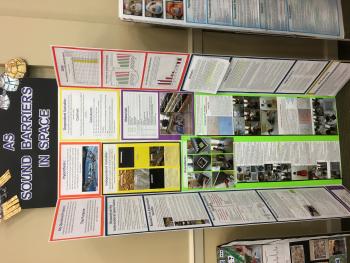
Science Slueths

- School:
- Immokalee Middle
- Subject:
- Science
- Teacher:
- Amie Grant
- Mayra Parra, Sidney Burnett, Cullen Mahoney
- Students Impacted:
- 300
- Grade:
- 6-8
- Date:
- August 14, 2023
Investor
Thank you to the following investor for funding this grant.
A Champion For Learning - $1,050.00
Original Grant Overview
Goal
The goal is for as many students as possible to participate in a school wide science fair. Many students in our school and community face financial hardships. Acquiring materials for an experiment with multiple trials and creating a board worthy of the student's ideas can be costly. It is my hope that we can assist students who need to purchase materials so they can fully participate and compete in our school science fair and hopefully go on to compete in our regional and state science fairs as well.
What will be done with my students
Science fair is a very challenging but rewarding process. Student must stretch beyond typical classroom expectations and immerse themselves in the scientific process they study about in class every day.
Science fair challenges students to seek an answer to a question they have developed based on a problem they see in their everyday lives or a topic which interests them. This helps the student to be engaged in the project and to see how science related to their everyday life.
After deciding a topic, they research it and develop a question, that can be tested. Students practice looking for reliable sources, document their sources, read and process the information to see what they can use. Students must decide what types of experimental trials they need, how many trials, and which materials they need to conduct their experiment. Students organize, plan, and strategize. They take ownership and pride in their work.
After the trials are complete, students must analyze their data and draw conclusions, which strengthens their critical thinking skills. Student also ponder what future experiments can be done and how their data is relevant to everyday life.
After completing a board, student then present their finished project to a group of judges from our school and community, which strengthens their interpersonal skills.
Science fair is a place where all students can come together and participate on their own level. Gifted students can be challenged to push deeper and think harder. Students with learning disabilities in self contained classes, who are often separated from the general school population, take pride in presenting what they have learned. English language learners can do a hands on investigation and practice their new language in a fun setting with supportive adults.
Many have been impressed with how the science fair competition has brought our school together in past years. We have even had multiple students conquer regionals and go on to win awards at the state competition! With your generous support, we can continue the tradition with a new group of students.
Benefits to my students
Through this process, students will engage with and develop a deeper understanding of the Nature of Science benchmarks, while exploring topics which are interesting to them and may lead to a future in STEM careers. Students will practice their communication skills while presenting their projects to multiple community members and school faculty.
Nature of Science" is the category of our science curriculum our students have traditionally struggled with the most. Some of the benchmarks students will engage with are the following:
SC.8.N.1.1 Define a problem from the science curriculum.
SC.8.N.1.2 Design and conduct a study using repeated trials and replication.
SC.8.N.1.3 Use phrases such as "results support" or "fail to support."
SC.8.N.1.4 Explain how hypotheses are valuable if they lead to further investigations, even if they turn out not to be supported by the data.
SC.8.N.2.2 Discuss what characterizes science and its methods.
Budget Narrative
Science boards run 70-100 dollars for 25 boards. Past materials requested have been: plants, seeds, soil, cups, light bulbs, popsicle sticks, paint, cloth material, soaps, ping pong balls, thermometers, timers, and many other items we don't have available at the school. It is difficult to list them specifically because it depends on the student projects. The medals, certificates, and ribbons are to award the students that participated. Board materials are used to make project boards presentable and stand out at the fair. The snacks are for the break time during science fair, while points are being tallied and the winners announced.
Items
| # | Item | Cost |
|---|---|---|
| 1 | 50 science fair boards | $200.00 |
| 2 | Materials for students with financial hardships | $300.00 |
| 3 | awards for top projects and ribbons for all participants | $150.00 |
| 4 | materials to create boards (glue, letters, borders, paper) | $200.00 |
| 5 | drinks and snacks for science fair presentation day | $200.00 |
| Total: | $1,050.00 |



Share
Please share this page to help in fulfilling this grant.
Email to a Friend